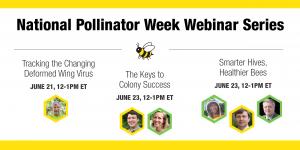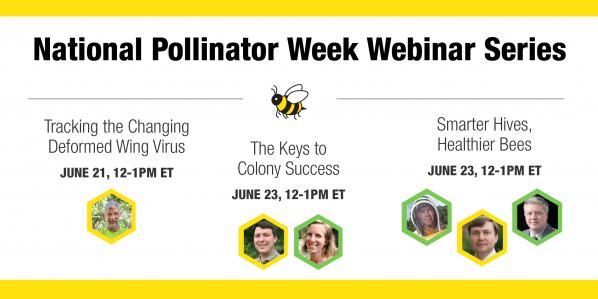According to a recent post from beehealth.bayer.us, three Appalachian State University professors will offer a free webinar on their research to improve honey bee colony health on Friday, June 23, from 12 – 1 p.m. ET.
The Smarter Hives, Healthier Bees webinar will feature a discussion by Computer Information Systems and Supply Chain Management Profssors Joseph Cazier and Ed Hassler and Computer Science Professor James Wilkes about advancements in the use of technology-assisted data collection at the honey bee colony level to assist beekeepers in making wise hive management decisions
Their "Smart Hive" project is aimed at building a data platform that identifies and improves best management practices (BMPs) through the tailoring of BMPs to specific apiary or hive locations. Additionally, the improved monitoring of hive conditions aims to reduce costs, increase efficiency in honey bee colony management and provide a measurable reduction in annual colony losses within both commercial and hobbyist operations.
The live webinar is part of a three-part series hosted by Bayer in partnership with Bee Culture and Project Apis m. to celebrate National Pollinator Week (June 19–23). Each webinar showcases innovative research aimed at making an immediate impact on honey bee colony health. The other two webinars are Tracking the Changing Deformed Wing Virus (Monday, June 19) andThe Keys to Colony Success (Wednesday, June 21.)
Researchers working on projects funded through the Healthy Hives 2020 initiative, a $1 million research effort to improve the health of honey bee colonies in the U.S. by the end of 2020, will present their findings on a number of critical bee health issues during a webinar series open to anyone interested in bee health.
Related: Walker College professor to further research on key bee health questions
This National Pollinator Week webinar series is an extension of Bayer’s commitment to research, education, partnerships and stewardship to address the needs of honey bees. Learn more about the webinars and Bayer’s bee health initiatives.
Dr. Joseph Cazier is director of the Center for Analytics Research and Education at Appalachian State University. Dr. Cazier completed a Ph.D. at Arizona State University in information systems. He is a leader in the field of analytics where he has worked on and published many grant-funded projects in Analytics. He has a keen interest in using analytics to build a better world, especially in the areas of education and sustainability. Additionally, Joseph serves as the Chief Analytics Officer for Blowing Rock Software and their HiveTracks brand where he leads analytics efforts to improve the survival of bees and their use in agriculture. In 2016 Joseph was named the University of North Carolina System Fellow in Technology commercialization.
Dr. James Wilkes is the chair and professor of Computer Science in the Department of Computer Science at Appalachian State University and co-founder of HiveTracks.com. Dr. Wilkes is a beekeeper, farmer, college professor and entrepreneur. He owns and operates Faith Mountain Farm, a family farm (wife and eight children) that includes about 100 honey bee colonies, a baking operation, cut sunflowers, pastured poultry, eggs and produce. His paying job is a professor and chair of the Department of Computer Science at Appalachian State University in Boone, NC. In this role he is also the Information Technology Lead for the Bee Informed Partnership. Lastly, James is CEO and co-founder of Hive Tracks, a hive management software system for beekeepers.
Dr. Ed Hassler is a professor of computer information systems in the Walker College of Business at Appalachian State University. Dr. Hassler's research interests are in the areas of evidence-based practice, analytics and artificial intelligence. He is now using these methodologies and techniques to solve problems in information technology, sustainability and apiary management. Previously, he was a visiting assistant professor in the Culverhouse College of Commerce at The University of Alabama, the senior network systems engineer at the Armstrong Group of Companies, a master instructor of military science and technology for the U.S. military, and an analysis and security specialist for the U.S Air Force. He has a MBA from Indiana University of Pennsylvania and a Ph.D. from The University of Alabama.
About the Center for Analytics Research & Education
The mission of the Center for Analytics Research & Education (CARE) is to engage and utilize the knowledge of our students, faculty, and staff to help promote pro-social behavioral change within organizations and society. To promote and enhance the reputation of the university and the center, CARE will live by the motto "Analytics for Good" by avoiding projects that would have a negative impact on society and seeking out those that have a positive impact. Two primary components that are inextricably linked are research and education. The center aims to gain new knowledge through academic research, conferences and papers; applied projects, such as consulting and workshops; and provide support to help internal and external systems through increasing the quantity and quality of data collection and analyses. By education, the center aims to provide support to degree program by hosting and supporting projects for students; offer executive education through consulting and workshops; and help university think about ways to improve the education process. Big data is inherently interdisciplinary and the need to appeal to all disciplines demonstrating the enhancement of research and other hidden relationships is vital to the advancement of the university. For more information, visit businesscare.appstate.edu.

